By KATHLEEN NELSON
The future of Catholic health care relies on the development of high-performing individuals with an innate passion for mission and healing and a penchant for analytical thinking and creative problem solving. To encourage young leaders to continue their careers in the ministry, CHA recognizes their achievements and potential through its Tomorrow's Leaders program.
This year, the program spotlights 10 dedicated individuals, age 40 or younger, who are doing much to advance the mission of Catholic health care. Here's a sampling of their impactful contributions:

Farber
Chief nursing officer,
PeaceHealth Sacred Heart Medical Center, University District, Eugene, Ore.
Ben Farber's focus as chief nursing officer is on compassion, heart and mission — and on improving patient care in a measurable way. He's developed unit — and department-specific performance improvement processes that have produced better patient outcomes and increased staff satisfaction.
Farber, 36, helped the hospital set up a shared governance council, so more voices would be heard. And he says improvements in the hospital's caregiver experience scores show "that we're living the mission not only for our patients but for each other."
Half the population in the hospital's service area live in poverty. Substance abuse and mental health issues are the community's primary concerns. Farber promotes care of the most vulnerable in part by training nursing staff to practice trauma-informed care. He advocates within the hospital for homeless and mentally ill patients. He is president of the HIV Alliance, which provides a variety of services in 11 Oregon counties such as testing, education and care management for people living with HIV/AIDS or hepatitis C.
"I really value taking care of people who are undervalued in our community — the people we forget about in our day-to-day lives, like the sick and the elderly, the homeless man standing on the corner talking to himself, the children with developmental health issues," he says.
"Ben can often be heard to say, 'I came for the work and I stay for the mission,'" says Victoria King, senior vice president and chief nursing officer for the PeaceHealth system.
"I appreciate Catholic health care's focus on the continuum of what a patient needs — body, mind and spirit," Farber says. "We focus on people being more complete than when they first came to us."

Gonzales
Chief medical information officer, Institute for Human Caring,
Providence St. Joseph Health, Torrance, Calif.
Like many in the medical profession, Dr. Matthew Gonzales found his calling through the experience of a beloved relative's illness. His uncle's death from AIDS at the age of 27 was formative in Gonzales' determination to be a healer and deliver whole person-oriented medical care. He's used his acumen in informatics to further that goal of improving patient care.
While working toward his undergraduate degree in human biology at Stanford University, he studied computer science. After graduation he worked as a software engineer for an online database that allows for the real-time analysis of HIV genomics to identify the best drug cocktail for an individual patient.
A palliative care rotation during his internal medicine residency at the University of California San Francisco resonated with him and he specialized in that field. Says Gonzales, 39, "I had time to sit down and listen to (patients') hopes and worries." While Gonzales kept notes on these conversations, he recognized the information was not routinely passed from clinician to clinician.
When he joined Providence St. Joseph Health, Gonzales worked with a team to adapt the system's electronic medical record platform to prominently set out the patient's goals of care. Those notes are now standard across most of the system's 51 hospitals. And an alert appears in the medical record when a physician orders an extraordinary intervention that runs counter to a patient's wishes as expressed in Physician Orders for Life Sustaining Treatment.
"What I love most is that the entire health system has aligned with the idea that we're tending to (patients') physical, emotional, spiritual and psychosocial needs," he says. "Getting to that feels revolutionary and exciting."
Dr. B.J. Miller is an assistant clinical professor of medicine at the University of California San Francisco Department of Medicine, where Gonzales completed his internal medicine and palliative medicine training. He calls Gonzales "a true pioneer in humanizing the electronic medical record by including end-of-life decisions."
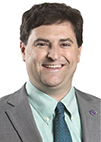
Gremmels
System director of ethics,
CHRISTUS Health, Irving, Texas
As a philosophy student at the University of Notre Dame, Becket Gremmels wrestled with thorny hypothetical questions. But it was real-life dilemmas like the heated legal and political battle over ending life support for Terri Schiavo and the use of human embryonic stem cells in research that honed his interest in unpacking and resolving complex quandaries in the context of Catholic moral tradition.
"People face difficult decisions in health care, and I like helping people in very difficult situations," says Gremmels, 34. His job puts him in the throes of what can be heart-wrenching and agonizing circumstances for patients and their families. In these ethics consults, he says he strives to offer compassion in the healing spirit of Christ.
Gerry Heeley, senior vice president and chief mission integration and leadership formation officer at CHRISTUS, says "Becket is able to translate the language of academic ethics into practical hands-on clinical ethics" for providers and patients. "He employs his gifts for the benefit of the entire CHRISTUS ministry."
Gremmels designed CHRISTUS' Clinical Ethics Intensive, a program that gives ethics committee members tools to perform clinical ethics consults. Since 2015, he has trained more than 150 CHRISTUS associates. He also led the effort to create systemwide standards for the structure, role and function of CHRISTUS' ethics committees.
Gremmels, who holds a doctorate in health care ethics, also contributes to the canon of academic bioethics, publishing two or three scholarly articles annually on Catholic health issues or organizational challenges. Dan O'Brien, senior vice president of ethics and church relations for Ascension and a mentor to Gremmels, says Gremmels realizes "he must address and stay engaged in the tough practical questions if he is to help advance the ministry into the future."
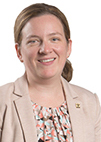
Grippon
Director, ecology and global ministries,
Bon Secours Health System, Marriottsville, Md.
Born and raised in Venezuela, Camille Grippon saw the harsh realities of life in the developing world: poverty, injustice, political unrest.
She says, "I knew very early in my life that I wanted to make a difference in the world, to be 'good help to those in need,'" citing the promise that is part of Bon Secours' mission statement.
Grippon, 38, has overseen Bon Secours' international health efforts in Peru and Haiti for six years. She's directed international disaster relief partnerships globally and ecology programs within the system's U.S. health care facilities. She's led medical missions and developed standards for relief mission trips that set out objectives for addressing community-identified needs in a culturally appropriate way. She manages the Bon Secours Health System emergency relief fund and international community-based services.
What she loves most about her job, though, is "working with the Sisters of Bon Secours, to learn from their leadership, dedication and joy, as well as feeling like my contributions make a valuable impact," she says.
She made an impact last year following devastating floods in Peru. With much of the infrastructure in disarray and no word from the sisters stationed in remote areas, Grippon traveled to Peru. Within a few days, she contacted the sisters and worked with relief organizations to bring aid to the remote village where they have a ministry. To raise awareness of the extent of the devastation brought by the flood and generate donations for relief efforts, she gave interviews to international and American media including Catholic Health World.
"Camille is a leader with a heart for ministry and the character to act fully in accordance with our Catholic faith," says Sr. Patricia A. Eck, CBS, chairperson of Bon Secours Ministries and congregation leader of the Sisters of Bon Secours of Paris.
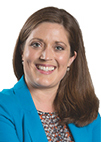
Haney
Vice president of operations, Health Leaders Network,
Franciscan Missionaries of Our Lady Health System, Baton Rouge, La.
Tara Haney is energized by a challenge. She is scaling the business equivalent of Mount Everest in her work to advance value-based care against the headwinds of shifting U.S. health care policy.
"Health care in the U.S. can't continue on the same path without serious adjustments to costs and outcomes," Haney says. "I'm not a clinician, but I still get to be a part of solving this huge problem, not only for Louisiana but on the national level. That's what gets me going and keeps me going."
Haney, 40, joined Franciscan Missionaries of Our Lady Health System in 2012 as part of Healthy Lives, the organization's employee wellness program. As the program expanded to other states, she took on executive responsibility for leading health system clients through their implementation of Healthy Lives.
In 2013–14 Haney helped start what became another thriving business at FMOLHS. She designed and administers Health Leaders Network, a clinically integrated network, now with more than 1,000 providers. Within two years of formation, the network covered 100,000 lives across Louisiana in value-based contracts. The number of covered lives continues to grow and all but one contract includes some level of financial risk.
She developed its physician-led governance structure and contributes to its population health strategy. FMOLHS says the network has improved care coordination for physicians and enhanced care transitions and access for patients.
Haney's boss, Dr. Richard Vath is chief clinical transformation officer and president of Health Leaders Network. He says Haney understands the need to improve care delivery, the steps necessary to improve population health and the necessity to address the social factors that hinder both. "Her leadership style is punctuated by a remarkable ability to engage those around her personally and professionally, allowing them to grow."

Heavens
Senior director of operational excellence,
Ascension Medical Group, Ascension Healthcare, St. Louis
Michelle Heavens has excelled as a nurse leader in multiple roles throughout Ascension.
As director of care excellence for Ascension Healthcare, a job she held several years ago, Heavens, 39, directed the adoption of patient safety and quality improvement programs systemwide. Through that experience she says she gained insight into operations and department systems, clinical priorities and different styles of leadership.
She's shared those insights broadly in articles in the American Journal of Infection Control and the Annals of Emergency Medicine. And she operationalizes them in the Ascension Medical Group, where she leads strategic plans and works directly with clinicians in the physician-led national provider organization to address the challenges they face.
"It is one thing to work hard, but it's another altogether to give your all to the work at hand" as Heavens does, says Susan Huber, Ascension's senior vice president of governance and president of Ascension Global Mission. "It is through this example that others have come to rely on Michelle for counsel and mentorship."
Heavens reached out in 2015 to her alma mater, the University of Minnesota, with an offer to guide students interested in improving health care quality, safety and reliability. That same year, Heavens was selected as executive fellow to the Ascension Health president and CEO Robert J. Henkel. Henkel, who retired as Ascension Healthcare's leader in 2017, says Heavens raised the level of attention to consumer feedback in all of Ascension's ministries.
Says Heavens: "I want to stretch beyond what is comfortable, learning and applying the skills I didn't know I had or needed. This will help me carry out the mission of Ascension."
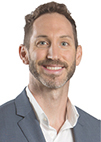
Klosterman
Vice president of mission and formation,
Mercy, Chesterfield, Mo.
Early in his career and before he came to work for Mercy, Kyle Klosterman made what seemed like disconnected moves: from corporate finance, to youth ministry, to community health. Yet he regularly draws on the breadth of those experiences to inform his practical contributions in mission and formation at Mercy.
Since joining Mercy six years ago, Klosterman, 38, has become a major contributor to the system's formation curriculum. He is the main author of Mercy's strategic plan for integrating mission and formation into every level of the health system, including clinical settings. He has worked with finance leaders to get them to see how their work contributes to the ministry and how their decisions around resource allocation can support stewardship and values.
He directed a first-of-its-kind research study to statistically validate the correlation between formation, co-worker engagement, physician engagement and patient satisfaction. He identified which mission-related items drove overall quality of care, likelihood to recommend, overall place to work and teamwork among physicians.
He co-authored a paper titled "Navigating Mission and Margin," which is used to educate Mercy's leaders on how mission aligns with, and is integrated into, operational goals.
"Kyle's ability to help co-workers draw the connection between the theoretical and the concrete is a gift that cannot be underestimated," says Kevin Minder, vice president of mission and community health at Mercy Hospital Oklahoma City.
Working with Mercy's business intelligence team, Klosterman also has led the development of reporting analytics that help the system's boards and leadership programs assess outcomes.
"Catholic health care allows me to bring my whole self to the work environment," Klosterman says. "I'm able to share my gifts and talents as it relates to business operations and to do so in a faith-based context."
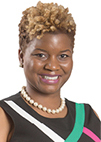
Sampson
Director of community health and well-being,
Mercy Hospital and Medical Center, Chicago
Public health has been Jameika Sampson's passion since 1993. When a friend of her mother's died of complications from HIV, it inspired Sampson to become a teen volunteer with an AIDS organization.
"I knew AIDS was a preventable disease and learned that I wanted to prevent diseases like this in all people," she says, adding that she has a special interest in improving the health and well-being of the medically marginalized. "Sometimes, the most vulnerable people see health as a privilege. And it shouldn't be," she says.
Sampson, 38, has helped form collaborations that champion health as a right for all. She has developed local and national partnerships to restrict tobacco advertising in minority communities and worked with clinicians and the Chicago Department of Public Health to improve clinical screening for tobacco use and access to classes and other smoking cessation supports.
"Jameika has the unique ability to bring innovative ideas and in-depth policy and systems thinking while creating space for the voices of diverse community members," says Jess Lynch, program manager for the Alliance for Health Equity and the Illinois Public Health Institute.
Sampson also works closely with the Centers for New Horizons, an early childhood center in Bronzeville, an under-resourced Chicago neighborhood in Mercy Hospital's core service area. She's worked to improve the nutritional quality of the food there as part of her overall efforts to address childhood obesity and advance health care equity. And she's led a vending initiative at Mercy Hospital that increased healthy offerings from 30 percent to 70 percent in one year. Mercy Hospital is part of Trinity Health.
"I believe that Jesus has called us to serve. Working in faith-based health care permits me to serve others through my profession," she says. "I share Jesus' belief in social justice and can live it out through healing initiatives."

Samuel
Medical director of hospitalist service,
St. Vincent's Medical Center, Bridgeport, Conn.
St. Vincent's Medical Center is the only professional home that Dr. Jemi Samuel has known. So, when it was in trouble, she treated it like family.
Following her residency, she joined the hospitalist staff in 2008. Seven years later, the director and several co-workers resigned, leaving behind a staff of 13 providers and a service devoid of leadership.
"I could have ditched my program or watch things fall apart," says Samuel, 38. "I couldn't do either one. I believe that God cornered me and said, 'You have come to your position for such a time as this.' (Esther 4:14) I believed he would provide."
Agreeing to work as an interim director, Samuel and her associate, Dr. Nathan Selsky, first hired temporary staff to fill the gaps, then set up what Samuel calls "a road show," meeting with hospital staff to understand their needs and devise a business plan. Nine months later, "interim" was removed from her title.
"She has not only hired very good providers to the program at very challenging times but has the skill set to work with them as a team," says Dr. Srinath Kadimi, medical director of St. Vincent's Stroke Center. "She is very soft-spoken and easily approachable."
Samuel also has implemented policies and systems that have led to the hospitalists improving in all their performance metrics at the facility, which is part of Ascension.
Her colleagues refer to her success as "the hospitalist renaissance." She redirects the praise to "the people that I work with. I'm glad I was able to step in and pay back an institution when it needed me."

Tellinghuisen
Operations administrator,
Essentia Health St. Mary's Medical Center, Duluth, Minn.
Through a decade on the financial side of health care, Kevin Tellinghuisen has learned that value-based care delivered as part of a health ministry must transcend a focus on dollars and cents. When done in the context of higher order goals, it benefits patients — particularly the poor and most vulnerable — the community and care providers. It can be a tool to improve health care access and equity.
"Ministry-based health care reminds me that our duty is beyond ourselves and our sustainability as an organization," he says. "Our duty extends to our community, which we strive to serve with hospitality, respect and justice."
Tellinghuisen teamed with physicians and operations leaders to develop new business models for adult behavioral health and palliative care that serve some of Duluth's most vulnerable patients. Process changes he identified and developed led to a savings of over $600,000 annually for the hospital.
"Most impressive is seeing this individual, primarily based out of the financial world, clearly understand and take to heart the importance of appropriately caring for these suffering patients and their families," says Dr. Dawn Drotar, Tellinghuisen's dyad partner at Essentia Health St. Mary's.
Tellinghuisen mentors staff and takes on conflict resolution assignments. His colleagues credit him with improving communication between physicians, nurses and other clinicians through a revised model of unit-based physician staffing.
"I enjoy the collective approach we take to navigating through health care's challenges," says Tellinghuisen, 36. "Each team member has unique experiences and perspectives, and our culture invites each of them to the table."
Copyright © 2018 by the Catholic Health Association
of the United States
For reprint permission, contact Betty Crosby or call (314) 253-3490.